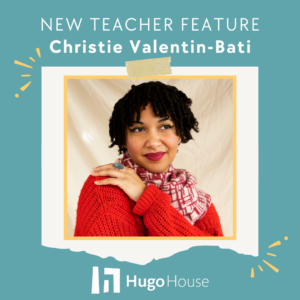What do folk stories and myths teach us about human truths? How do people, particularly marginalized and oppressed peoples, utilize folklore and mythology as tools of resilience, community, and grief? Joining us this quarter Christie Valentin-Bati will look to exploring and facilitating these conversations in her class Writing with Folklore & Myth: Resilience, Community, & Grief beginning November 2. We chatted with Christie about her class, what excites and enlivens her as an instructor and writer, and more!
 Q&A with Christie Valentin-Bati
Q&A with Christie Valentin-Bati
How would you describe yourself as a writing instructor? Alternatively, what type of instructor do you inspire to be?
My main goal as an instructor is to bring out the language that exists in all of us already and to refine it. We all carry unique life experiences, stories, and idiosyncrasies— often, writers think they need to strip themselves of these traits to be a “good writer,” but really good writing is just about what can elicit a sense of aliveness in your reader. Craft techniques like simile, plot, or metaphor are often placed as the primary focus for learning, but I think the hardest part of writing is figuring out what moments and particular details are “on fire with their aliveness.” Content first, form second.
What excites you about teaching at Hugo House?
I’ve sat in on a few classes and have been a part of Write-O-Rama. I’ve found that the students at Hugo House are all engaged and enthusiastic which is all any instructor ever wants. I am excited by the possibilities of bringing in new and experimental forms of writing like writing to audio, blending images and text, and trying out non-conventional writing prompts and exercises. I know the students will be receptive and excited to experiment with me.
Who is your class best suited for? What would you like your students to take away from the class?
My class is suited for everyone, but especially those interested in global studies/non-western cultures and are curious about mythology and crafting work that infuses everyday life with things as fantastical as gods and goddesses. A big question will be: how does the use of folklore and mythmaking bring forth the questions/truths about our human experience? Though there is an emphasis on poetry, the class contains a variety of readings and prompts including flash fiction and non-fiction narrative.
What advice do you have for writers working through a creative block?
Creative block often stems from putting too much pressure on one’s self to write something good. Rather than trying to write something “good”— just try to write something truthful. I often like to sit and write the present moment: what I am seeing, hearing, feeling, touching—and using language as exact as possible to describe my surroundings for at least 10 minutes. In doing this, I don’t need to try hard to create something original; I am just jotting down the world as it is. I find that if I do this enough times my brain begins to form its own ideas and I go from there.
What are you reading now? How do you approach reading as a writer?
I just finished Notes on a Past Life by David Trinidad (a 1/2 gossip tell-all and 1/2 poetic memoir) which really moved me. In between vivid descriptions of everyday life are immense moments of loss where Trinidad works through the grief of losing friends during the height of the AIDs epidemic, his mother dying, living in New York before and after 9/11, and a “divorce” (in quotations as this was before the legalization of gay marriage). I try to approach reading by only picking works by writers that make me feel alive and those who have a brilliant grasp of lyrical language no matter the genre. When I find a line that particularly moves me, I write it down. And I look up every word I don’t know in the dictionary.
Tell us about an author, poem, idea, storyline, sentence—something that has you currently captivated.
I’m currently captivated by the idea of audience and who one writes for. I read Dark Traffic by Joan Naviyuk Kane and Rules of the House by Tsering Wangmo Dhompa. Both authors write about their lives in different ways, but neither write for or toward the outsider perspective. The two authors never bother to directly define who the people of their books (F., S., “she”) are and instead allow the reader to figure it out (or not) as they read along. It feels very refreshing to read a piece of work that is not interested in the voyeur and refuses to dumb itself down or define the things of the book on the chance that a reader outside of Kane’s indigenous community or in Dhompa’s case unfamiliar with Taiwanese culture may not understand them. Either a reader will look up the things they don’t know or they won’t.
Christie Valentin-Bati is a poetry teaching artist based in Chicago. Her work received honorable mention from the Academy of American Poets, was commissioned by the ACLU, and her micro-chapbook “Journal” was showcased in Porous Gallery. She loves plants and shadows.
Register now for Writing with Folklore & Myth: Resilience, Community, & Grief »
Learn more about Christie Valentin-Bati:
Website: www.christievb56.wixsite.com/christievalentinbati
Instagram: @christie.vbati